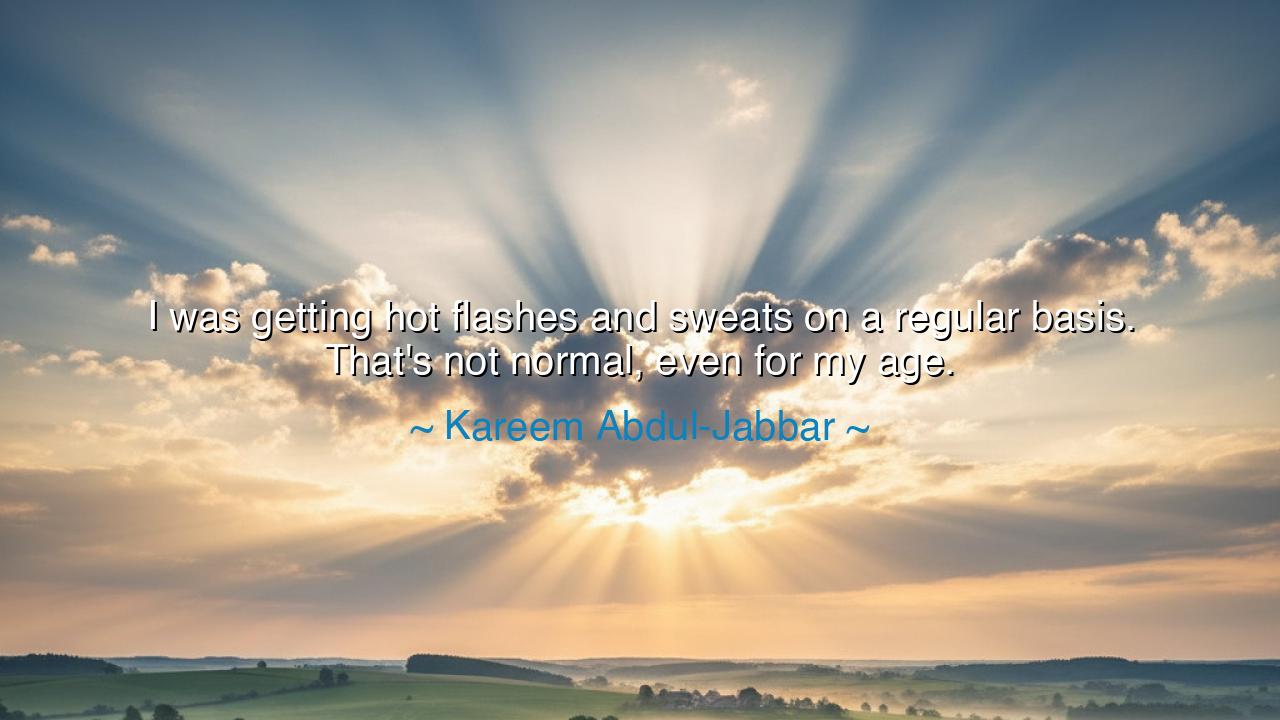
I was getting hot flashes and sweats on a regular basis. That's
I was getting hot flashes and sweats on a regular basis. That's not normal, even for my age.






"I was getting hot flashes and sweats on a regular basis. That's not normal, even for my age." – Kareem Abdul-Jabbar
In the long and storied journey of human life, there are moments when the body, once a source of strength and vitality, begins to show signs of wear and decline. Kareem Abdul-Jabbar, one of the greatest basketball players in history, speaks of such a moment, when he felt his own body shifting in ways that were unexpected and, at times, unsettling. The hot flashes and sweats he describes are not simply physical symptoms—they are symbols of a deeper truth: the inexorable passage of time and the challenges that come with growing older. In his words, we hear not only the reality of aging, but also the shock and frustration that can accompany it, especially for those who have spent their lives in the service of physical excellence.
The ancients, too, were not strangers to the suffering that comes with the limitations of the body. Consider the story of Hercules, the great Greek hero, whose body, though seemingly invincible, was eventually undone by the trials he faced. Even the mightiest of men, as the myths taught, could not escape the fragility of the flesh. Hercules, despite his extraordinary feats, faced moments of vulnerability—times when his strength was not enough to protect him from the inevitable weaknesses that time and circumstance would impose. Abdul-Jabbar, much like Hercules, has spent his life cultivating a body that brought him glory. But as he, too, faces the realities of aging, he reflects the universal truth that no one is immune to the challenges time brings.
In the ancient Greek world, the struggle between youth and age was a central theme in the works of the philosophers and poets. Plato, in his writings, speaks of the inevitable transition from youth to old age, a time when the body begins to lose its vitality, and the mind must adapt to the realities of decline. The philosopher Socrates was deeply aware of the limits of his own body, even as he sought to understand the eternal truths of the world. But wisdom does not come from denying the inevitable changes of age; rather, it comes from accepting them with grace and learning how to live fully, even as the body begins to fail. Abdul-Jabbar’s experience of hot flashes and sweats speaks to this same truth—the physical body may grow weaker, but the spirit must remain resilient.
There is also a deeper wisdom in Abdul-Jabbar’s acknowledgment of his own vulnerability. The world of professional sports is one where the body is often idolized, where youth and strength are the ultimate measures of worth and ability. But as Abdul-Jabbar reaches the later stages of his life, he, like the great figures of antiquity, must confront the reality that the body’s power is not eternal. He is reminded of the fragility of the human condition, a theme that runs throughout ancient wisdom. The Stoics, particularly Epictetus and Marcus Aurelius, emphasized that true strength lies not in the body, but in the mind—in the ability to accept what is beyond our control and to adapt to the changes that life brings.
Abdul-Jabbar’s words also serve as a reminder that aging is not a weakness but a natural part of life’s cycle. Socrates did not fear growing old; instead, he embraced it as part of his ongoing quest for truth and understanding. Similarly, Abdul-Jabbar’s willingness to speak openly about his physical struggles is a form of courage. It is an acceptance that the body will age and that this is not something to be feared, but something to be understood. The greatness of the human spirit lies not in perpetual youth, but in the ability to continue striving for purpose and meaning even as the physical self fades.
The lesson we must draw from Abdul-Jabbar’s reflection is profound: aging is not a time for resignation, but for renewal. Just as Hercules faced his trials with bravery, and Socrates sought wisdom until his last breath, so too must we approach aging not with fear, but with the determination to continue living with dignity, purpose, and grace. We must cultivate the strength to face our physical limitations and continue to grow, learn, and contribute to the world in whatever way we can. The key is not to fight against the changes that time brings, but to adapt and evolve—just as Abdul-Jabbar did on the basketball court, and just as he continues to do in his later years.
In practical terms, the lesson is this: as we face the inevitable changes of age, we must take action to ensure that our mind, spirit, and purpose remain strong. This might mean embracing new passions, focusing on mental and emotional well-being, and seeking ways to contribute to the world even as our physical strength fades. The wisdom of the ancients teaches us that while the body may weaken, the mind and heart can continue to grow and flourish, if only we give them the space to do so. Adaptation and resilience, then, are the true hallmarks of strength, even in the face of physical decline.






AAdministratorAdministrator
Welcome, honored guests. Please leave a comment, we will respond soon